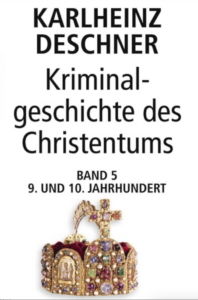Criminal History, 189
For the context of these translations click here.
PDFs of entries 1-183 (several of Deschner’s books
abridged into two) can be read here and here.
 De bellis Parisiacis or ‘Nothing that would have been worthy of imperial majesty’
De bellis Parisiacis or ‘Nothing that would have been worthy of imperial majesty’
In November 885, the invaders’ Great Army appeared off Paris. Allegedly with countless small ships and 700 larger ships as well as a force of 40,000 men, they travelled up the Seine—possibly an act of revenge for the treacherous murder of their king, Gottfried, in May of the same year, in which Hugo was also blinded.
Together with Count Odo of Paris, the future king, Bishop Gauzlin (from the noble Rorgonid dynasty, once one of Charles the Bald’s closest confidants and archchancellor, chief shepherd of Paris from 884) initially took command of the encircled city, whose famous siege was described by an eyewitness, the monk Abbo, in his epic poem De bellis Parisiacis. When Bishop Gauzlin fell ill and died another clerical warhorse, Abbot Ebolus of St. Germain-des-Prés, led the defence, which became increasingly difficult, especially as the only East Frankish army sent to relieve the city under the notorious Count Henry withdrew without having achieved anything. The Normans had long since pillaged the surrounding countryside according to all the rules of the ‘art of war’ and did not shy away from cruelty in their assaults on the city. They are even said to have slaughtered their prisoners and filled the moats with their corpses. In any case, ‘many were killed on both sides, even more were incapacitated by wounds’. The Normans ‘continued their assault day after day’, they harassed Paris ‘without ceasing with the most diverse armoury of weapons, machines and wall-breakers. But as they all cried out to God with great fervour, they were always saved; and the battle lasted about eight months in various ways before the emperor came to their aid’ (Annales Vedastini).
It did not help, neither that of various count’s troops nor that of the church—Walo of Metz, ‘who took up arms against the holy precept and his episcopal dignity and went to war’. He fell ‘in the year of our Lord 882’ while fleeing from the Normans. Again and again, we read that there was no help at all, no resistance (nemine sibi resistente), or that if military action was taken, ‘nothing happy or profitable’ came of it (nil prospere vel utile), that ‘nothing memorable’ (nihil dignum memoriae) was accomplished. ‘And they accomplished nothing profitable there but returned to their homeland with great dishonour. For instead of striking a fortunate blow, they barely escaped in disgraceful flight, most of them being captured and killed’ (Annales Vedastini).
The emperor was also disappointing.
It was not until October that he finally arrived and encamped on the heights of Montmartre. The army was formidable, but the commander, Count Henry, himself an accomplished treacherous murderer and slayer fell with his horse into a Norman pit and, abandoned by his own, was killed in it. Charles could not make up his mind to do anything. For weeks he remained inactive and ‘did nothing in this place that would have been worthy of imperial majesty’. When it was even rumoured that a relief army under king Siegfried was already approaching the Seine, he bought off Paris and gave the Normans the territories on the other side of the Seine ‘for plundering because the inhabitants of the same would not obey him’ (Regino von Prüm).
Charles also left Burgundy to be plundered by the enemy but remained in the west for the time being. However, King Siegfried had already invaded the Oise and followed Charles, ‘devastating everything with fire and sword. When the emperor learnt of this—and the fire brought him certain news—he quickly returned to his country.’ Siegfried then continued his work of destruction. In the following year, 887, they ‘continued their usual raids as far as the Saone and the Loire and turned the country into a desert by burning and murder’ (Annales Vedastini). King Siegfried, however, turned to Friesland in the autumn, where he was killed.